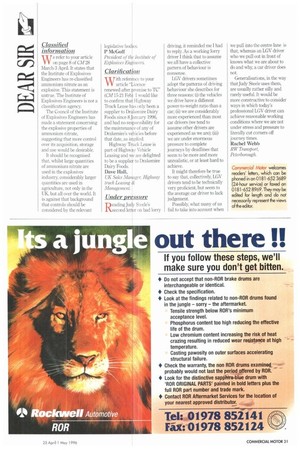Classified information
Page 33

If you've noticed an error in this article please click here to report it so we can fix it.
we refer to your article on page 8 of CM 28 March-3 April. It states that the Institute of Explosives Engineers has re-classified ammonium nitrate as an explosive. This statement is untrue. The Institute of Explosives Engineers is not a classification agency.
The Council of the Institute of Explosives Engineers has made a statement concerning the explosive properties of ammonium nitrate, suggesting that more control over its acquisition, storage and use would be desirable.
It should be recognised that, whilst large quantities of ammonium nitrate are used in the explosives industry, considerably larger quantities are used in agriculture, not only in the UK, but all over the world. It is against that background that controls should be considered by the relevant legislative bodies.
P McGoff President of the Institute of Explosives Engineers.
Clarification
with reference to your article "Licence renewed after promise to TC" (CM 15-21 Feb) I would like to confirm that Highway Truck Lease has only been a supplier to Drakemire Dairy Foods since 8January 1996, and had no responsibility for the maintenance of any of Drakemire's vehicles before that date, as implied.
Highway Truck Lease is part of Highway Vehicle Leasing and we are delighted to be a supplier to Drakemire Dairy Foods.
Dave Hall, UK Saks Manager, Highway truck Leasing & Management.
Under pressure
Deading Judy Steele's 1\second letter on bad lorry
driving, it reminded me I had to reply. As a working lorry driver I think that to assume we all have a collective pattern of behaviour is nonsense.
LGV drivers sometimes adopt the patterns of driving behaviour she describes for three reasons: (i) the vehicles we drive have a different power-to-weight ratio than a car; (ii) we are considerably more experienced than most car drivers (we tend to assume other drivers are experienced as we are); (iii) we are under enormous pressure to complete journeys by deadlines that seem to be more and more unrealistic, or at least hard to achieve.
It might therefore be true to say that, collectively, LGV drivers tend to be technically very proficient, but seem to the average car driver to lack judgement.
Possibly, what many of us fail to take into account when we pull into the centre lane is that, whereas an LGV driver who we pull out in front of knows what we are about to do and why, a car driver does not.
Generalisations. in the way that Judy Steele uses them, are usually rather silly and rarely useful. It would be more constructive to consider ways in which today's professional LGV driver can achieve reasonable working conditions where we are not under stress and pressure to literally cut corners off journey times.
Rachel Webb RW Transport, Peterborough.
Commercial Motor welcomes readers' letters, which can be phoned in on 0181-6523689 (24-hour service) or faxed on 0181-652 8969. They may be edited for length and do not necessarily represent the views of the editor.
























































































































